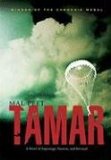Summary | Excerpt | Reviews | Beyond the Book | Readalikes | Genres & Themes | Author Bio

A Novel of Espionage, Passion, and Betrayal
by Mal PeetThe air shook; you could feel it. And the noise was unbelievable. It is probable that humans had never heard anything like it, since it was perhaps the sound of the planet giving birth to its mountains, of raw young continents grating together. In the fields of southern England, animals panicked and continued to panic because the noise would not stop. At a stables in Buckinghamshire, every horse kicked out the door of its stall and bolted. Near Mildenhall, in Suffolk, a line of military vehicles came to a halt, and men tumbled out of the trucks to stare at the sky. A doctor, driving with his head out of the window to look upwards, ran into the back of the convoy and was killed instantly.
It was Sunday 17th September, the middle of the morning. People were in church. The pulsing downward beat of the noise overwhelmed their hymns. Choirs gave up. In Westminster Abbey the vast sound of the organ was drowned by it. Men, women, and children went into the streets and gazed up, speechless, at the vast migration of mechanical birds that filled the sky. You could not see where it began, nor where it ended.
An army had given up the earth and taken to the air. It was flying to Holland to end the war. The aircraft — bombers, paratroop transports, gliders swaying at the end of three-hundred-foot cables, fighter escorts — set out for Europe in enormous columns ten miles across and a hundred miles long. One of the pilots who survived said later that the air was so packed with planes it looked like you could climb out onto the wings and walk all the way to the Dutch coast.
On a crescent-shaped lawn, part of the grounds of a large country house just north of London, about sixty people watched the vast airborne armada pass. They were a mixed bunch, men and women, some young, some not. Some wore uniforms; others were in civilian clothes. Few were known by their real names. Towards the middle of the lawn, close to a tarnished bronze statue of Eros, two young men lay on their backs watching the spectacle. The Special Operations Executive had given them the code names Dart and Tamar. Although both men were fluent in English, they spoke in their native Dutch.
Dart said, "I think we are witnessing the beginning of the end of the war."
Tamar saw a heavy glider swing into the path of another and then somehow correct itself. In Holland, flights of German fighters would be taking off. They couldn’t miss so huge a target. He was watching men being flown — being dragged — to their deaths. My God.
"We’ll not go in now," Dart said. "They’ve been wasting our time. The codes, the parachute jumps, the wireless stuff, all that shit. It was just a damn cover. They were planning this all the time."
Tamar turned onto his right side. "Listen — even if those poor bastards up there drive the Germans out of our country, that won’t be the end of it. The Nazis have broken everything. There is no organization. There is no trust anymore. Some of our people are collaborators; some are heroes. I’m almost as afraid of liberation as I am of anything else. So don’t imagine there is nothing for us to do, that we have been wasting our time."
He rolled onto his back and watched the infinite planes cross the sky. "One way or another," he said, "we’ll be in Holland soon. I’d bet my life on it."
Dart was arrested in the early hours of the morning. He was awakened by a Luger pistol pressed against his temple and a torch blazed into his face. There were two men, a sergeant and a private in Waffen-SS uniforms. He received some rough assistance getting to his feet, and then a bag or hood was pulled over his head. The Germans half marched, half dragged him along a corridor, the pistol barrel at the base of his skull. They went through three sets of doors and made four turns. Dart tried to retain his sense of direction but lost it. He half fell down a long flight of stairs and at the bottom found himself standing on cold stone. A door closed behind him, and he was forced onto a hard wooden chair. His arms were wrenched behind his back and his wrists cuffed. The hood was removed.
TAMAR. Copyright © 2007 Mal Peet. Reproduced by permission of the publisher, Candlewick Press, Inc., Cambridge, MA.
Your guide toexceptional books
BookBrowse seeks out and recommends the best in contemporary fiction and nonfiction—books that not only engage and entertain but also deepen our understanding of ourselves and the world around us.